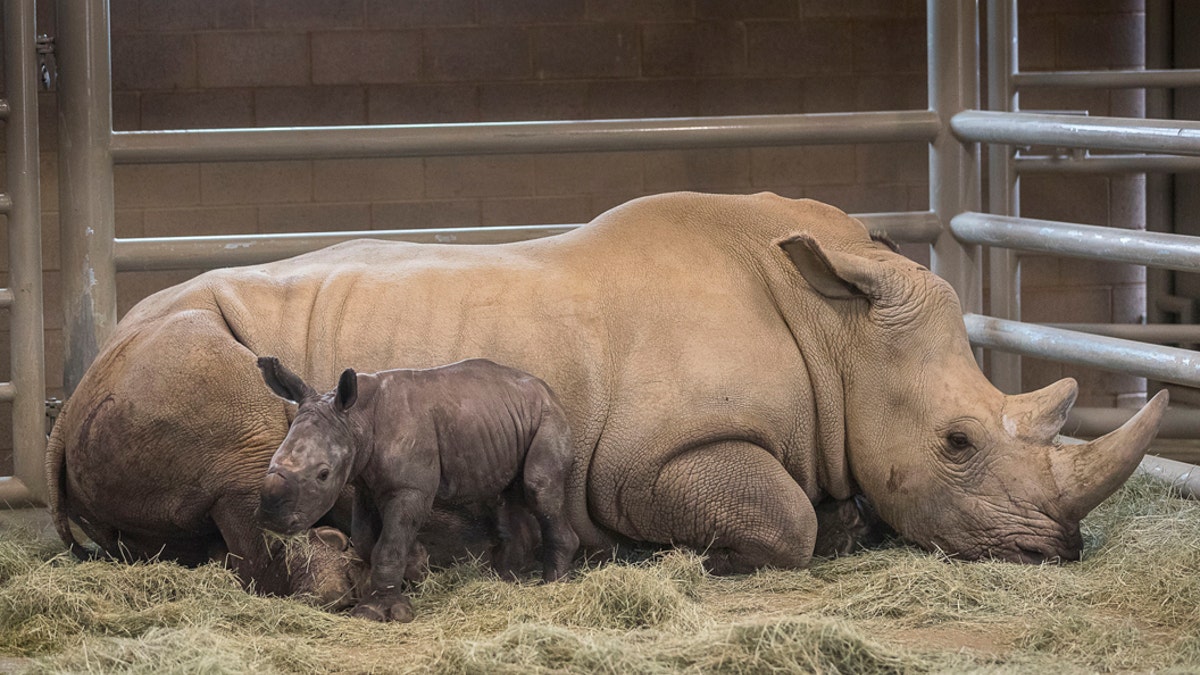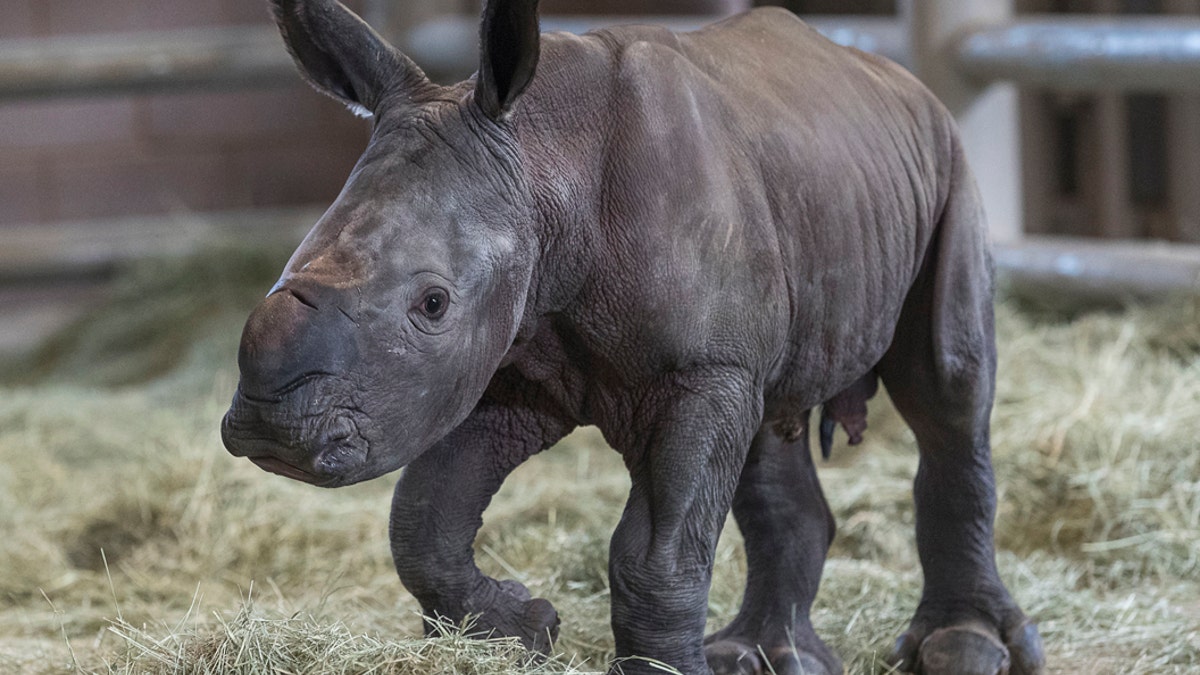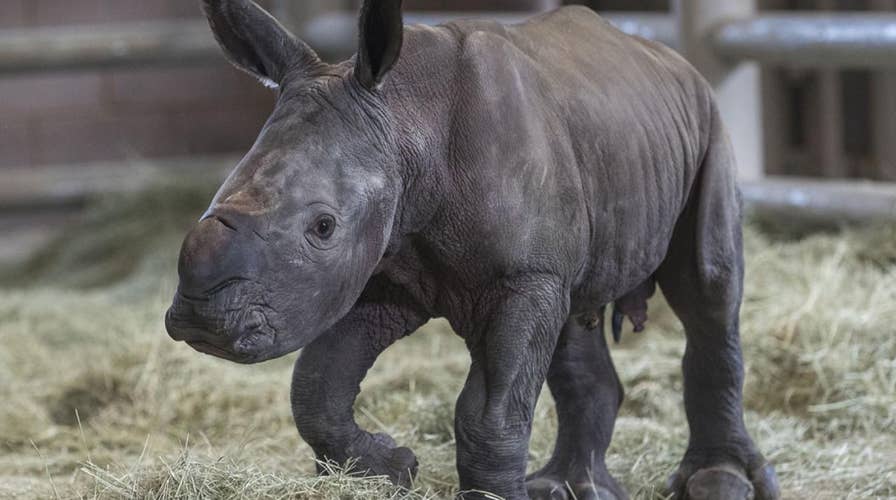Rhino saved? Southern white rhino gives birth aided by artificial insemination
Using artificial insemination scientists are trying to save the Northern White Rhino.
The southern white rhinoceros, the only rhino species not endangered, could be one step further away from extinction after a San Diego-based conservation organization said it achieved the first successful artificial insemination birth of a southern white rhino in North America.
The San Diego Zoo Global said that Victoria gave birth to a healthy male calf on Sunday at San Diego Zoo Safari Park following 30 minutes of labor.
"All of us at San Diego Zoo Global are elated with the arrival of this special rhino calf," Barbara Durrant, director of reproductive science at San Diego Zoo Global, told the Associated Press.

This Monday, July 29, 2019 photo provided by the San Diego Zoo shows a day-old southern white rhino calf stands beside its resting mother, Victoria, at the Nikita Kahn Rhino Rescue Center at the San Diego Zoo Safari Park in Escondido, Calif. The zoo has announced the first successful artificial insemination birth of a southern white rhino in North America. (Ken Bohn/San Diego Zoo via AP)
SUDAN, THE WORLD'S LAST MALE NORTHERN WHITE RHINO, DIES FROM 'AGE-RELATED COMPLICATIONS'
Victoria was successfully artificially inseminated with frozen semen from southern white rhino Maoto in March 2018. She carried the calf for 493 days and they will now bond with each other, away from the public.
Eventually, the male calf, which has not been given a name yet, will be introduced to the other five female rhinos at the Nikita Kahn Rhino Rescue Center.

This Monday, July 29, 2019 photo provided by the San Diego Zoo shows a day-old southern white rhino calf standing on its wobbly legs at the Nikita Kahn Rhino Rescue Center at the San Diego Zoo Safari Park in Escondido, Calif. (Ken Bohn/San Diego Zoo via AP)
"Not only are we thankful for a healthy calf, but this birth is significant, as it also represents a critical step in our effort to save the northern white rhino from the brink of extinction," Durrant added.
White rhinos are considered Near Threatened, according to the World Wildlife Fund. It is estimated that between 19,600 – 21,000 animals exist in protected areas and private game reserves.
The northern white rhino, of which there are only two (both female) left on Earth, is considered a subspecies of the southern white rhino. In March 2018, the last remaining male northern white rhino, "Sudan, died from “age-related complications" at the age of 45.
White rhinos can live to ages between 40 and 50 years.
"Not only are we thankful for a healthy calf, but this birth is significant, as it also represents a critical step in our effort to save the northern white rhino from the brink of extinction."
Scientists are currently working on trying to save the critically endangered northern white rhinoceros from extinction, including using the southern white rhinos as surrogates.
In November, researchers from the U.K.’s University of Cardiff and the University of Venda in South Africa analyzed genetic samples from 232 rhinos and discovered that, despite the populations of northern and southern white rhinos splitting over a million years ago, they have sometimes shared genes.
Researchers say that genes have typically been shared during cold and arid periods, as recently as 14,000 years ago, when African grasslands expanded. “By looking at the white rhino’s population history we’ve been able to establish that there was contact between northern and southern rhino populations throughout history,” said Dr. Isa-Rita Russo of Cardiff University, in a November 2018 statement announcing the findings.
WARNING GRAPHIC IMAGES: INCREDIBLE PHOTOS SHOW GREAT WHITE SHARKS DEVOURING WHALE
The AP reports that researchers are optimistic that a northern white rhino calf could be born from these processes within 10 to 20 years.
In May, scientists at the Polish zoo Chorzow successfully completed a procedure where they transferred a northern rhino test tube embryo back into a female southern white rhino whose eggs were fertilized in vitro. However, the embryo transferred at Chorzow zoo is smaller than expected. It remains to be seen whether it will implant in the mother's uterine lining and result in a pregnancy.
"There are a lot of technical problems that will be solved, but it will take time," Cesare Galli, whose company specializes in artificial reproduction of horses, told The AP in June.
In April, Zoo Miami welcomed the birth of the first rhino ever to be conceived from induced ovulation and artificial insemination.
The Associated Press, Fox News' James Rogers, Ryan Gaydos and Ann Schmidt contributed to this story.









































